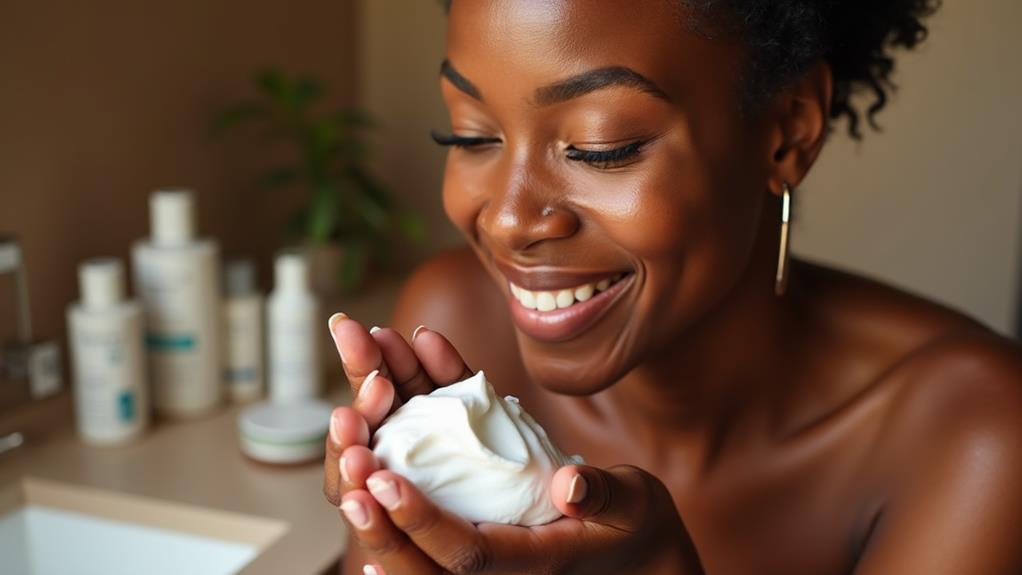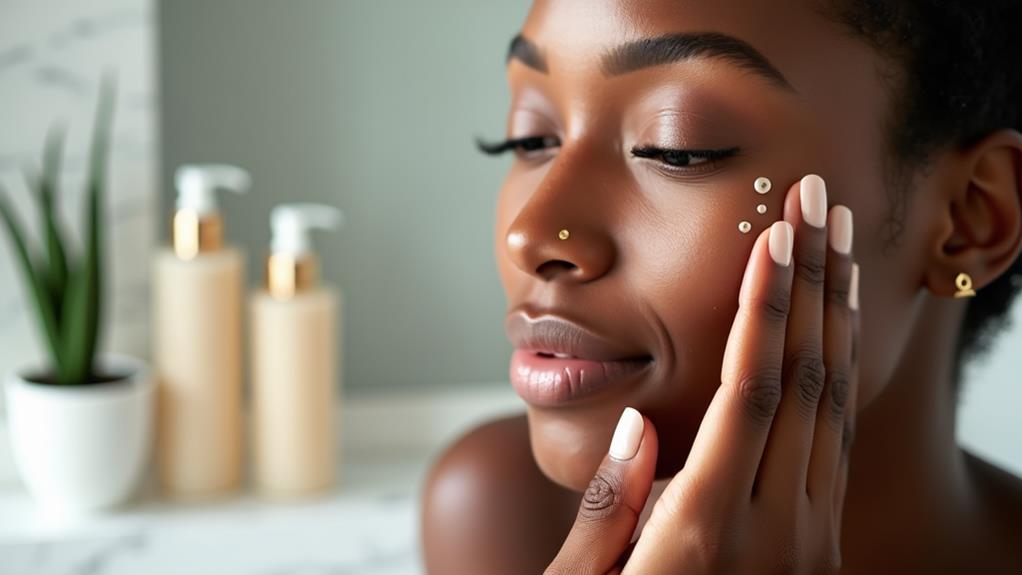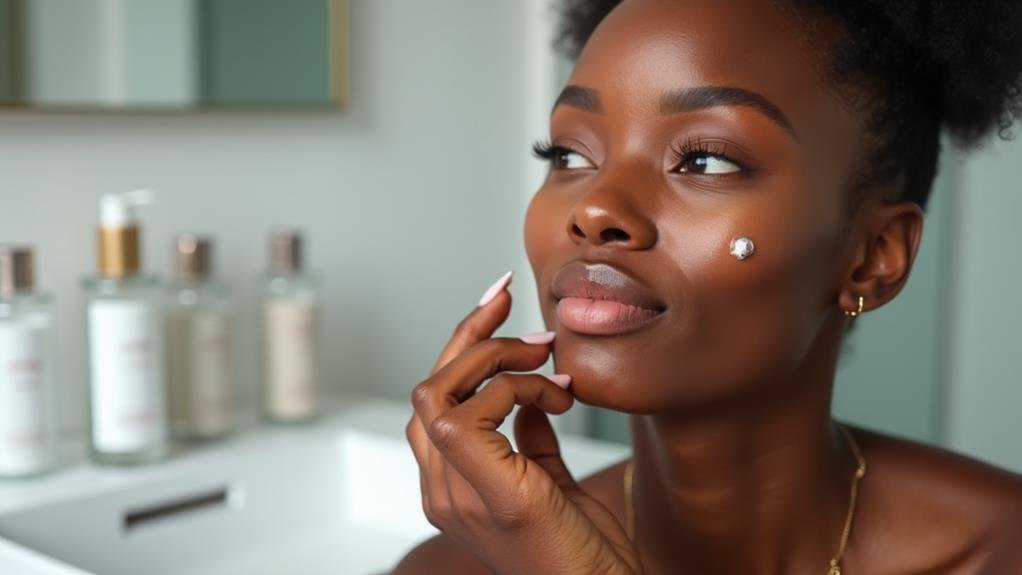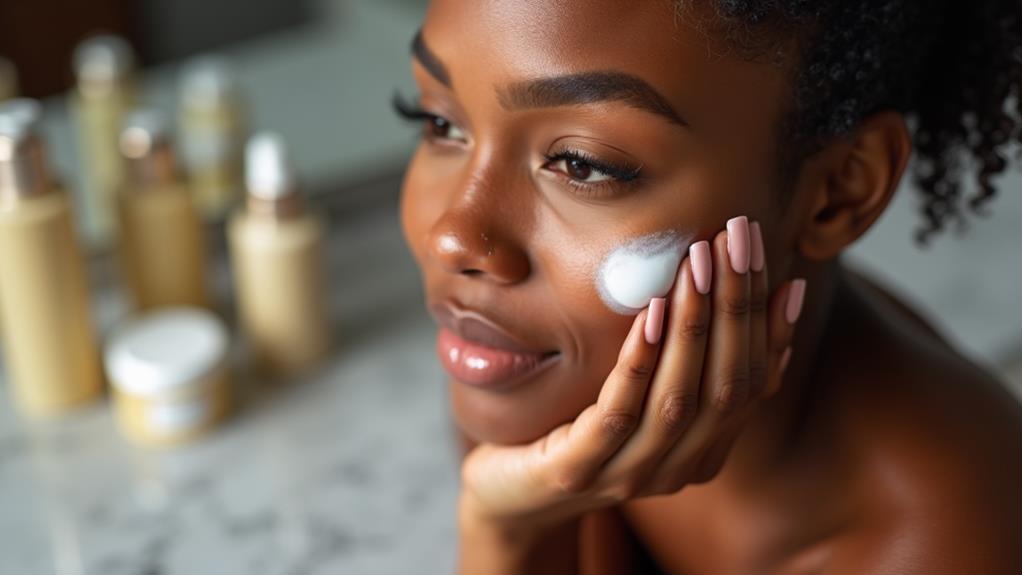If you're struggling with acne and have Black skin, you're not alone. Finding the right products can be challenging, but dermatologists have identified effective solutions tailored to your specific needs. From gentle cleansers to potent spot treatments, there's a range of options that can help you achieve clearer, healthier-looking skin without causing irritation or hyperpigmentation. But it's not just about what you put on your face; it's also about understanding how these products work together to address your unique skin concerns. So, what exactly should you be looking for in your acne care routine?
Key Takeaways
- CeraVe Foaming Facial Cleanser and Urban Skin Rx Clear Skin Cleansing Bar effectively cleanse acne-prone black skin.
- Gentle chemical exfoliants with salicylic acid or glycolic acid are preferred over harsh physical scrubs.
- Niacinamide serums regulate oil production and reduce inflammation while addressing hyperpigmentation concerns.
- Non-comedogenic, oil-free moisturizers with hyaluronic acid and glycerin hydrate without clogging pores.
- EltaMD UV Clear and Black Girl Sunscreen offer non-comedogenic, tinted protection against UV-induced hyperpigmentation.
Gentle Cleansers for Black Skin

Consistently, gentle cleansers are the cornerstone of an effective acne care routine for Black skin. When choosing a cleanser, look for products that won't strip your skin of its natural oils or disrupt its pH balance.
Opt for cleansers containing ingredients like salicylic acid or benzoyl peroxide, which can help combat acne without causing excessive dryness.
CeraVe's Foaming Facial Cleanser is a dermatologist-favorite for Black skin. It's non-comedogenic and contains ceramides to help maintain your skin's protective barrier.
Another excellent option is Neutrogena's Oil-Free Acne Wash, which effectively removes excess oil without over-drying.
For those with sensitive skin, consider Cetaphil's Gentle Skin Cleanser. It's fragrance-free and won't clog pores.
If you're dealing with hyperpigmentation alongside acne, try Urban Skin Rx's Clear Skin Cleansing Bar, which contains kojic acid to help even out skin tone.
Exfoliating Products That Won't Irritate
Exfoliation plays a key role in acne care for Black skin, but it's important to choose products that won't cause irritation or worsen hyperpigmentation. When selecting exfoliating products, opt for gentle chemical exfoliants rather than harsh physical scrubs. Look for ingredients like salicylic acid, glycolic acid, or lactic acid in lower concentrations.
Start with a product containing 2% salicylic acid, which can penetrate pores and reduce acne-causing bacteria. For alpha-hydroxy acids (AHAs), begin with a 5-7% concentration of glycolic or lactic acid. These help remove dead skin cells and promote cell turnover without causing excessive irritation.
Consider using exfoliating pads or toners, which provide a controlled application and are less likely to over-exfoliate. Incorporate these products gradually, starting with once or twice a week and increasing frequency as your skin adjusts. Always follow up with a moisturizer to maintain skin hydration.
If you have sensitive skin, look for products containing polyhydroxy acids (PHAs) like gluconolactone. These offer gentle exfoliation with minimal irritation and are suitable for daily use.
Remember to patch test new products and discontinue use if you experience any adverse reactions.
Acne-Fighting Serums and Treatments

Several effective serums and treatments can target acne in Black skin while addressing associated concerns like hyperpigmentation.
Look for products containing ingredients like salicylic acid, benzoyl peroxide, or retinoids, which are proven to combat acne. However, be cautious with benzoyl peroxide, as it can be drying and potentially irritating for darker skin tones.
For a gentler approach, try serums with niacinamide, which helps regulate oil production and reduce inflammation. Vitamin C serums can also be beneficial, as they fight acne-causing bacteria while brightening dark spots.
Don't forget about spot treatments containing tea tree oil or sulfur, which can effectively target individual blemishes without over-drying your skin.
When choosing treatments, opt for non-comedogenic formulas to prevent clogged pores. If you're dealing with post-inflammatory hyperpigmentation, look for products with kojic acid or licorice extract to even out your skin tone.
Remember to introduce new products gradually and patch-test them first to guarantee they don't cause irritation.
Consistency is key in acne treatment, so stick to your chosen products for at least 4-6 weeks to see noticeable results.
Moisturizers for Acne-Prone Black Skin
While treating acne is important, moisturizing remains a key step in any skincare routine for Black skin. For acne-prone skin, you'll want to choose non-comedogenic moisturizers that won't clog your pores.
Look for lightweight, oil-free formulas that hydrate without leaving a greasy residue. Ingredients like hyaluronic acid and glycerin are excellent for attracting and retaining moisture without causing breakouts.
Niacinamide is another beneficial ingredient that can help regulate oil production and improve skin texture. For added benefits, seek moisturizers with antioxidants like vitamin C or E, which can help protect your skin from environmental stressors and reduce hyperpigmentation.
If you have particularly oily skin, gel-based moisturizers can provide hydration without feeling heavy. For combination or dry skin, opt for lotions or creams that offer more intense hydration.
Always apply your moisturizer to slightly damp skin to lock in hydration.
Spot Treatments for Dark Spots

Dark spots, a common concern for Black skin, often require targeted treatments. When dealing with post-inflammatory hyperpigmentation, you'll want to look for ingredients that effectively fade discoloration without causing further irritation.
Hydroquinone, a powerful lightening agent, is often recommended by dermatologists for stubborn dark spots. However, it's essential to use it under professional guidance, as prolonged use can lead to adverse effects.
For a gentler approach, consider products containing kojic acid, vitamin C, or niacinamide. These ingredients work to inhibit melanin production and promote cell turnover.
Azelaic acid is another excellent option, offering both anti-inflammatory and skin-brightening properties. When selecting a spot treatment, opt for formulations specifically designed for melanin-rich skin to guarantee compatibility and effectiveness.
It's important to be patient with spot treatments, as results may take several weeks to become noticeable.
Always pair these treatments with a broad-spectrum sunscreen to prevent further darkening of spots. Remember, consistency is key in your skincare routine, and combining spot treatments with other acne-fighting products can lead to ideal results for your skin.
Sunscreens Safe for Acne Care
Choosing the right sunscreen is essential for Black skin prone to acne. You'll want to look for products that are non-comedogenic and oil-free to avoid clogging pores.
Mineral-based sunscreens containing zinc oxide or titanium dioxide are often recommended, as they're less likely to cause irritation.
For darker skin tones, it's important to find a sunscreen that doesn't leave a white cast. Many brands now offer tinted options or formulas specifically designed for melanin-rich skin.
Look for ingredients like niacinamide, which can help with both acne and hyperpigmentation.
Some dermatologist-approved sunscreens for acne-prone Black skin include EltaMD UV Clear Broad-Spectrum SPF 46, Black Girl Sunscreen SPF 30, and La Roche-Posay Anthelios Clear Skin Dry Touch Sunscreen SPF 60.
These products offer broad-spectrum protection without exacerbating acne or leaving a visible residue.
Remember to apply sunscreen daily, even on cloudy days or when you're indoors. This habit will help protect your skin from UV damage, prevent dark spots from worsening, and support your overall acne care routine.
Nighttime Repair and Renewal Products

Nighttime skincare offers a prime opportunity to address acne concerns in Black skin. As you sleep, your skin undergoes natural repair processes, making it an ideal time to apply targeted treatments.
Look for products containing retinoids, such as adapalene or tretinoin, which can help unclog pores and promote cell turnover. These ingredients are particularly effective for treating hyperpigmentation, a common concern in Black skin.
For gentle exfoliation, consider incorporating glycolic or lactic acid into your nighttime routine. These alpha-hydroxy acids can help remove dead skin cells and improve overall skin texture.
If you're dealing with inflammatory acne, products containing niacinamide can help reduce redness and soothe irritation.
Don't forget to moisturize, even if you have oily skin. Look for non-comedogenic, oil-free formulas that won't clog your pores. Ingredients like hyaluronic acid and ceramides can help hydrate and strengthen your skin barrier without exacerbating acne.
Remember to patch test new products and introduce them gradually to avoid potential irritation. Consistency is key in achieving clear, healthy skin, so stick to your nighttime routine for best results.
Acne-Fighting Face Masks
Face masks can pack a powerful punch in your acne-fighting arsenal, especially for those with Black skin. When choosing a mask, look for ingredients like clay, charcoal, and sulfur, which can help absorb excess oil and unclog pores without over-drying your skin.
For Black skin prone to hyperpigmentation, opt for masks containing niacinamide or licorice root extract. These ingredients can help even out skin tone while fighting acne. Glycolic acid masks are also effective but use them sparingly to avoid irritation.
Don't forget about hydration. Incorporate masks with hyaluronic acid or aloe vera to maintain moisture balance. This is essential for preventing the overproduction of oil that can lead to more breakouts.
Apply your chosen mask once or twice a week, depending on your skin's needs. Be sure to patch test new products and introduce them gradually into your routine. If you experience any irritation or increased breakouts, discontinue use and consult a dermatologist.
Skincare Tools for Black Skin

Skincare tools can be game-changers for Black skin, offering enhanced cleansing and exfoliation when used correctly. For acne-prone Black skin, a gentle silicone cleansing brush can help remove excess oil and debris without causing irritation.
Look for one with soft bristles and multiple intensity settings to customize your cleansing routine.
Jade rollers and gua sha tools can improve circulation and reduce inflammation, which is particularly beneficial for hyperpigmentation caused by acne. These tools work best when used with a facial oil or serum to provide slip and enhance absorption.
For at-home exfoliation, consider a microdermabrasion device designed for darker skin tones. These tools use fine crystals or diamond tips to gently remove dead skin cells, improving texture and promoting cell turnover.
However, it's essential to use them sparingly to avoid over-exfoliation.
LED light therapy masks can target acne-causing bacteria and reduce inflammation. Look for devices with blue and red light settings, as blue light fights acne while red light helps with healing and reducing hyperpigmentation.
Always patch test new tools and start with the lowest intensity settings to guarantee your skin tolerates them well.


